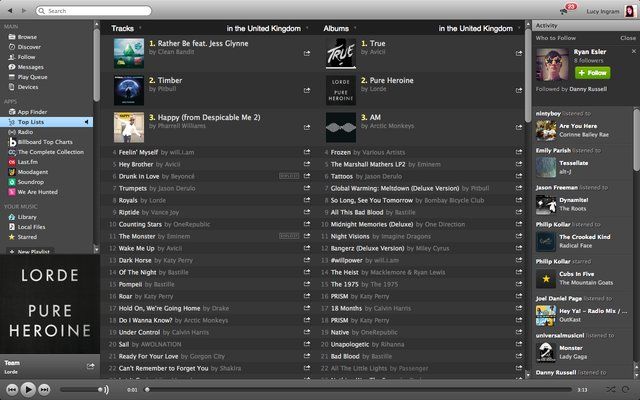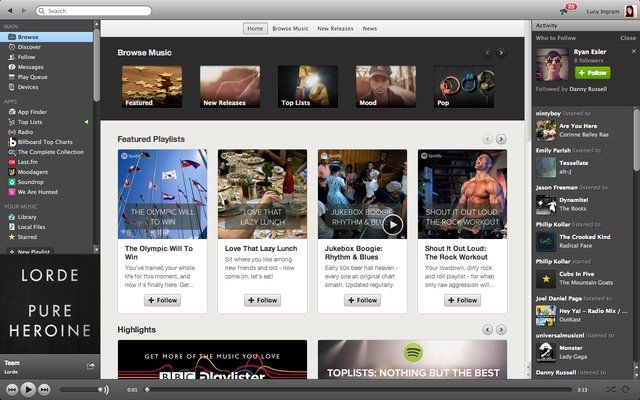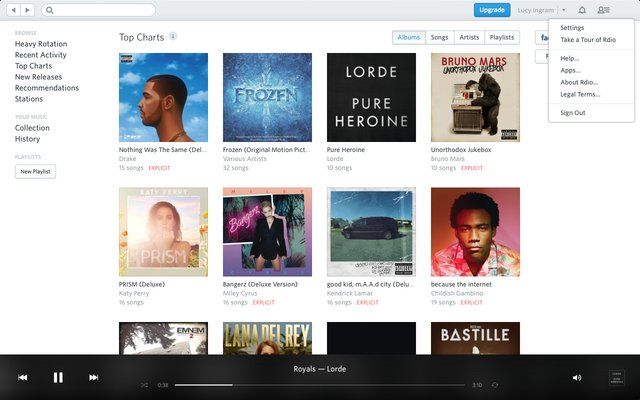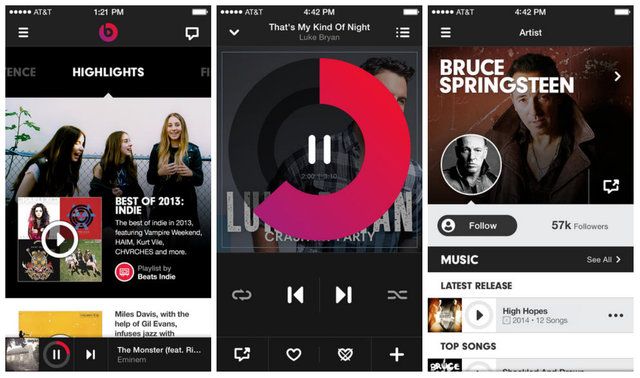In 2001, Apple changed the way music was distributed with the arrival of iTunes, its online digital media store. Since that time, the digital age has evolved rapidly into an era where cassette mix tapes and compact discs are no more. As we enter an era in which the internet serves our every need, alongside digital distribution and the iTunes Store are an increasing number of on-demand music streaming services have become today’s most popular and possibly cost-effective means of accessing the equivalent of walking into your local music store and buying everything.
Unlike Pandora and iTunes Radio (which we’ll cover shortly in another column), on-demand streaming radio allows you to listen to any music in the service library as often as you like.
The competition between the unlimited all-you-can-stream music services is fiercer than ever before, and with the launch of Beats Music this past month, it has become even more difficult to pinpoint the most suitable music subscription for our needs.
However, after hours of research, a comparison of the seven on-demand services on offer (including Beats Music, Spotify, Rdio, Xbox Music, Rhapsody, Sony Music Unlimited, and Google Play Music–see our table below), and some hands-on testing, we’ve managed to narrow down the overwhelming choice to a select few that offer the best overall features and usability. So let’s crack on with the results, shall we?
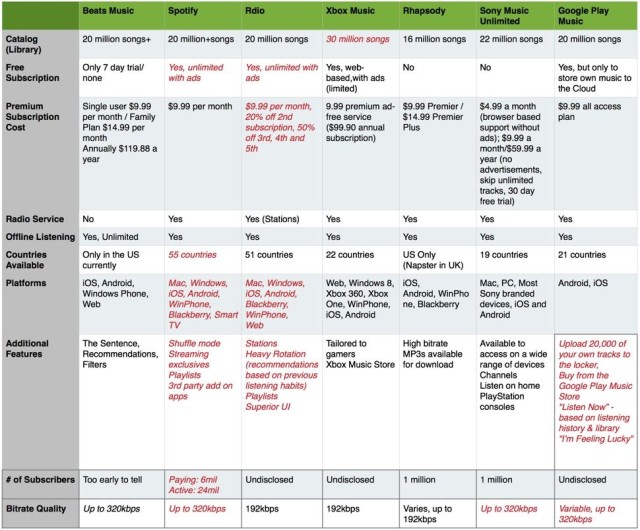
THE WINNER – SPOTIFY
Best all-around user experience
It wasn’t too long ago when Spotify unlocked the ability to stream for free from mobile devices without paying for a subscription. Though you won’t get the full shebang, and it’s ad-supported with commercials, users can create playlists for free and play through them on a shuffle basis. The major drawback is the limit of only six skips per hour, which can be pretty restricting if you’re picky like myself. That said, it still means that if you’re a free subscriber you don’t have to commit to paying a single cent and can still enjoy the music you love on the go. Alternatively, if you’re an iPad user, the free ad-based version is flexible in that it allows you to play any song as much as you like. This could be a worthwhile compromise if you have an iPad and aren’t particularly fond of the shuffle mode aspect of the mobile version.
For $10 a month though, the Premium subscription of the Spotify service is absolutely worth it, especially if you enjoy music on the go with no limitations. Not only are there no ads or commercials to contend with, but the audio quality is considerably higher, there’s the option to download tracks to your device for offline playback (handy if you’re on the subway a lot), and there are no skip limits as well as full access to the mobile apps. Overall, the premium version is far more superior than the free one.
Also worth noting is Spotify’s huge catalog of music, which boasts a whopping 24 million tracks. Included within that number are Spotify exclusives, such as the recent addition of a whole backlog of Led Zeppelin albums, unavailable anywhere else as of yet. Furthermore, even if you’re not a mobile or tablet user, the desktop app is still available to listen to as much music as you like for free.
Spotify has the highest amount of five star reviews currently on the App Store. Says iOS user Reacharounds of the premium subscription, “All your songs from when you were growing up, and all the current stuff. Loads of extra albums and live performance albums on here for all your favorite artists. Worth the [premium subscription.]”
Likewise, Spotify is very much a popular choice with Android’s Google Play users; the four and five star rated reviews collectively amounting to a higher total overall than the one to three star reviews combined. Most of the negative reviews relate to some of the stability issues, but this is mostly an Android-focused perspective, not of the service itself.
Reddit is one of the most popular sites for online debate and social discussion these days, and in a thread regarding on-demand music services, user SiriusCyberneticCorp states, “With Spotify, I feel like I get so much more than the music itself. Everything’s beautifully organized, the quality is universally high, the sharing facilities are actually well implemented rather than annoying – and it’s so simple to discover new music that matches one’s tastes.”
Spotify doesn’t come without issues, however, but most of these grievances are linked to the free version more than anything else. The lack of a repeat button can be somewhat frustrating for those who like to listen to a track more than once but this is only a small inconvenience. If you have a paid subscription, there’s nothing stopping you from searching for the track again. The free version is fairly restrictive with its mandatory shuffle system and limitations on skipping, but it’s also one of the only services which allows free users to sync their favorite tracks and listen to their music offline for as long as they like. It’s worth mentioning that if you’re not a regular Spotify listener, (and this accounts for the Premium subscribers too), the playlists or songs that have been synced to play offline can from time to time need to be synced again, even if you’re not in offline mode. There’s no explanation for this bug, which continues in the updated version of the app, but it’s not a huge issue and is easily worked around.
Another more apparent downside is the recent confirmation that Chromecast users will indeed be able to access more music services by way of Rdio and Beats Music, who have both announced they are working with Google to enable support. Unfortunately, there’s still no word on whether Spotify will be joining this bandwagon, which is a slight disappointment for those who favor Spotify over the other music services.
It’s also recently just been announced that registered Last.fm users will be able to sync their profiles with their Spotify account, and vice-versa, if they are subscribed to both services. Last.fm’s recent partnership with Spotify gives Last.fm users access to its 20 million song library, but beneficial to Spotify subscribers is access to Last.fm’s 700 million streamable tracks, which boosts Spotify’s already growing library considerably. In a statement, Last.fm managing director Simon Moran said, “This collaboration with Spotify brings the together the best qualities of both services, creating a stronger listening and discovery experience for music lovers across the globe.”
More recently, within the last month, Spotify opened up a merchandizing feature to all artists across the UK and US, as well as in Ireland, Aus, NZ, Denmark, Sweden, Norway and Iceland. With plans to roll out this service elsewhere in the future, this could be yet another successful move for Spotify. With the ability for fans to buy any merchandise they wish from t-shirts and posters, to deluxe box-sets and vinyl, it remains without a doubt that Spotify will keep growing in popularity.
In relation to other similar apps and music streaming services, it may be a close call, but Spotify still reigns. Pandora remains a popular streaming app in the US, but it differs in a huge way from any on-demand music service. When comparing Spotify to Pandora and iTunes, creator Daniel Ek stated in an interview with Billboard that despite Pandora’s 76 million large user-base in the US, Spotify is not competing. “We want to be the place where you store and collect, where you build your playlist for your dinner party or your workout,” he said. “That is very different from Pandora.” iTunes on the other hand, was more of a rival since it allows users access to their own music. However, “the benefit of being on Spotify as opposed to iTunes is huge … it is so obvious that Spotify is much better because you can put more than 20 million songs in your pocket and access at any moment.”
Though the recent release of Beats Music caused some divergency in regards to opinion, there are many reasons to still make Spotify your number one service for on-demand music. Ellis Hamburger of The Verge says of Beats Music, “Downloading tracks for offline mode is speedy, but picking and playing tracks is noticeably slower than in an app like Spotify, which makes playback speed its top priority.”
For the perfect go-to app for all your listening music needs, Spotify still remains the number one choice.
Catalog: More than 20 million songs available globally.
Free streaming option: Yes! Unlimited with ads, in fact. Mobile platform offers shuffle option only.
Cost for unlimited use: $9.99 per month for all-device access without ads.
Number of subscribers: Paying: over 6 million; Active: over 24 million
HONORABLE MENTIONS
RDIO
Spotify’s younger rival cuts it pretty close in terms of purpose and functionality, especially considering it hasn’t been around as long as its older, more superior cousin. Rdio’s smaller music library is just one reason that Spotify remains the popular choice, coming in at just over 20 million tracks compared to Spotify’s 24 million and counting. Catalog wise, there may be a couple of significant differences that give Rdio a slight edge; namely the broader range of diverse artists which in turn means Rdio may well be slightly more advanced in terms of music discovery. Rdio also has the advantage of being able to add music to a “collection,” rather than relying on a series of playlists. However, it’s heavy reliance on its integration with social media can be slightly off-putting, as it uses this method to be consistent with its recommendations.
Another factor that plays its part is audio quality. Many music lovers will expect a certain quality when paying for a music streaming service, and Rdio’s measly 192kbps is a slight disappointment compared to the more acceptable 320kbps offered by other music streaming services.
Desktop applications are also important when it comes to narrowing a decision down, and Rdio’s desktop app is a little diluted compared to the faster, more responsive desktop app offered by Spotify. Disappointingly, it doesn’t offer more than basic functionality, so there’s no definitive reason just yet to use this over the web player in your browser.
Rdio may well be the lesser-known service, but its competitive prices can certainly overshadow most alternatives, which is also a reason that it comes in a close runner up. If you’re based in the US, there’s a huge 50% discount for those who sign up as a student or to the family plan. The discount also applies to web only listeners, who can stream from their computers at a reasonable price of $4.99.
Catalog: 20 million songs.
Free streaming option: Free and unlimited with ads.
Cost for unlimited use: $9.99per month for all-device access without ads.
Subscription base: Undisclosed, but Rdio says that 90 Percent of its subscribers are on its $9.99 unlimited streaming plan.
BEATS MUSIC
The recently launched Beats Music has a lot of heart, but with so many other alternative and popular music subscription services, it’s hard to pinpoint exactly what it has to offer that the others don’t already.
It’s unique user experience, playful interface and interesting approach to music discovery definitely offer something different, but at the same time is altogether a little too random in some respects. Upon launching the app, you’ll go through a get-to-know you sequence in which you’re able to pick a few genres and artists that are to your liking. It’s a great idea, but the choices are fairly lacking, and since it uses this information to recommend albums “Just For You” then it may not be as tailored to your tastes as you want. Another section for recommendations, “The Sentence”, presents you with a sentence in which you fill in the blanks selecting from a series of words. Although a playful and fun take on discovering new music, it can be a little hit-or-miss in terms of the outcomes it suggests.
If you’re looking for personalization and curation, Beats Music certainly triumphs above all of the others in this respect, and its vibrant, sleek interface stands out beautifully amongst the crowd. That said, the lack of a desktop version and a limited number of platforms to experience Beats Music upon means it falls quite far behind in terms of usability. Add to this the fact that Beats Music hasn’t been around all that long, the lack of a free version, and that it’s currently only available in the US, and it’s obvious that Beats Music is the inferior choice as it stands currently.
That’s not to say it doesn’t have its benefits though, and for those who love a truly personalized experience with its own series of characteristics, it’s definitely worth checking it out.
Catalog: More than 20 million songs.
Free streaming option: Seven-day trial.
Cost for unlimited use: $9.99 per month or a five-person family plan through AT&T for $14.99 a month.
Subscription base: Too early to tell. Beats are hoping MOG subscribers will transfer to their service when the MOG service closes down (April 15th).
ROUND UP
- Spotify: International availability, all round best user experience, best audio quality, biggest song catalog.
- Rdio: More exclusive rights with certain artists, sound quality isn’t the best.
- Beats Music: Best for playlist and music discovery, great sound quality.
Ultimately the final decision is down to personal choice and circumstance, but each of the above music services all have their own free trials (though Beats Music limits its trial to seven days). For usability and the biggest music catalog, Spotify is your best bet, but if you’re personally not fussed about audio quality and like discovering a whole range of artists, Rdio may well be the one for you. Unfortunately it’s early to say whether Beats Music is in line for the throne considering how new a service it is but it definitely wins in terms of creativity.
Obviously the best plan of action is to trial each one for a significant amount of time and see if it manages to meet your needs, but if the services above don’t tickle your fancy, then there are a couple of alternatives that just about made it into our top five.
ALTERNATIVE SERVICES
RHAPSODY
Catalog: 16 million songs
Free streaming option: No (30 day trial)
Cost for unlimited use: $9.99 a month Premier Plan, $14.99 a month Premier Plus
Subscription base: 1 million
XBOX MUSIC
Catalog: 30 million songs
Free streaming option: Yes, web-based, with ads
Cost for unlimited use: $9.99 Premium ad-free service
Subscription base: Undisclosed

